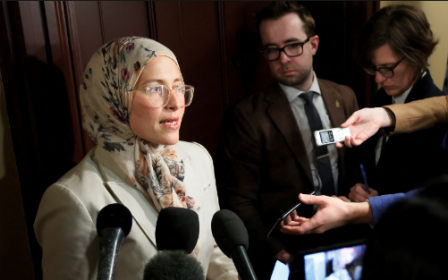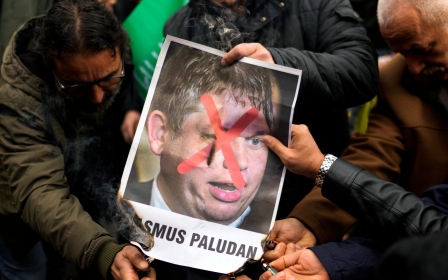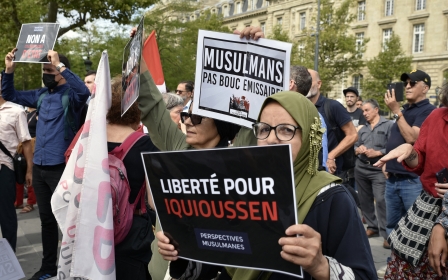Quebec: Why are politicians attacking an effort to combat Islamophobia?
Just days before World Hijab Day, Quebec’s politicians took aim at Canada’s newly appointed special envoy to combat Islamophobia, Amira Elghawaby, calling on Prime Minister Justin Trudeau to remove her from the position.
These voices claimed that Elghawaby, a visible Muslim woman, held "anti-Quebec sentiments", pointing to a 2019 piece she co-wrote as evidence. In it, she rightly noted that statistics show that many Quebecers held anti-Muslim views.
Right-wing politicians in Quebec have a history of negative attitudes towards the hijab and Muslims writ large
Apparently, her audacity to accurately interpret survey results was reason enough to demand her removal from this newly created position. It is one that is desperately needed in a country plagued by Islamophobia. For Quebec’s politicians, the feelings of Quebecers trumped the lives and safety of Muslims.
There are numerous angles through which we could analyse this situation: Elghawaby is a Muslim woman who wears the hijab. Right-wing politicians in the province have a history of negative attitudes towards the hijab and Muslims writ large.
Elghawaby has a long track record of documenting and analysing the prevalence of Islamophobia in Canada, and in particular in Quebec. The province has a disturbing history of anti-Muslim racism manifesting in various forms such as hate crimes and discriminatory policies.
New MEE newsletter: Jerusalem Dispatch
Sign up to get the latest insights and analysis on Israel-Palestine, alongside Turkey Unpacked and other MEE newsletters
Politicians have played a central role in creating this environment, using Islamophobia to bolster votes and pass harmful legislation, resulting in the othering of the region’s Muslims and effectively rendering them second-class citizens.
Elghawaby's appointment to this position thus symbolises tangible efforts by the government to tackle anti-Muslim hate. This would also inevitably mean that certain politicians and their tactics would be scrutinised and observed as playing a role in fanning the flames of anti-Muslim bigotry in the country.
Targeting women
In June 2019, Quebec passed Bill 21, a law aimed at upholding the "secular" values of the province. This term is increasingly weaponised to justify blatant discrimination against Muslims in many countries. The bill bans individuals who serve in public-facing jobs (such as school teachers, government lawyers, police officers, and many other civil servants) from wearing religious symbols at work.
While on paper this may appear as "religious neutrality", in reality it has single-handedly targeted and impacted the province’s Muslim women.
In November, lawyers for groups challenging the law noted that it "overwhelmingly discriminates against Muslim women". Perri Ravon, an attorney representing the English Montreal School Board (EMSB), informed the judge that she "could find no examples of anyone in any organisation across the province losing their job due to Bill 21 other than Muslim women". She further noted that in the EMSB, "eight people have lost jobs or been denied employment due to Bill 21. All were Muslim women."
In addition to this structural discrimination, Quebec’s Muslims have also experienced shocking levels of Islamophobic violence. On 29 January 2017, a white nationalist walked into a Quebec City mosque and opened fire on 53 Muslims as they prayed, killing six Muslim men and injuring 17 others.
The gunman later told police that he was motivated to carry out the attack in response to Trudeau’s message welcoming refugees following then-US President Donald Trump’s announcement of a Muslim ban.
It’s important to note that Quebec’s leading politicians hold similar contempt for immigrants and refugees. The province’s premier, Francois Legault - who skipped this year’s commemoration of the sixth anniversary of the shooting, and previously rejected a proposal to mark 29 January as a "Day of Action Against Islamophobia" - had just last year claimed that inviting more than 50,000 newcomers to the province "would be a bit suicidal".
A common belief
The extreme statement is actually common amongst far-right believers of the "white genocide" conspiracy theory, and many have used such views to justify the killing of Muslims, including the Christchurch gunman who killed 51 worshippers at two mosques in New Zealand. Shockingly, over a third of Quebecers share the premier’s feelings: a 2017 Radio-Canada poll found that 32 percent of the people in the province favoured a ban on Muslim immigration to Canada.
Poll after poll has shown that there is rampant anti-Muslim sentiment in Quebec, with a 2016 poll conducted by Forum Research finding that "the most unfavorable feelings toward Muslims were found among Canadians from Québec (28 percent) and among conservatives (40 percent)".
Additionally, statistics of anti-Muslim hate crimes in the province demonstrate the severity of the situation. It’s frankly preposterous that Elghawaby is being publicly abused in this manner simply for stating the obvious: Islamophobic attitudes are persistent in the province.
Between 2016-2021, Canada "suffered more mass killings motivated by Islamophobia" than any other country in the G7. There have been numerous studies and documented evidence showing the rise and spread of white nationalism across the country, with Muslims and immigrants of color remaining their primary target.
It's not only shocking but also disturbing that ruling elites would go after a veiled Muslim woman who has spent years researching, writing, and calling attention to the plague of Islamophobia
Within this context, it's not only shocking but also disturbing that ruling elites would go after a veiled Muslim woman who has spent years researching, writing, and calling attention to the plague of Islamophobia. Not only is this manufactured outrage aimed at demonising Elghawaby and shutting down scrutiny into the prevalence of Islamophobia in Quebec, it also puts her life in danger.
Just as Bill 21 aims to regulate and police Muslim women’s bodies, effectively forcing them to choose between their faith or their livelihoods and limiting their roles in public life, the response from Quebec’s politicians has been to regulate and police Elghawaby’s speech.
For a province that claims to uphold the value of free speech, it sees no contradiction in censoring and silencing Elghawaby. After continuous pressure, she apologised for her statements in the 2019 piece, but Quebec’s rulers weren’t satisfied.
They called for her removal and went a step further and demanded the position itself be done away with. This episode isn’t just about Elghawaby’s 2019 piece, rather it’s a backlash from those in power who seek to silence and stop any efforts that may hold them accountable for the hate that they sow.
The views expressed in this article belong to the author and do not necessarily reflect the editorial policy of Middle East Eye.
Middle East Eye delivers independent and unrivalled coverage and analysis of the Middle East, North Africa and beyond. To learn more about republishing this content and the associated fees, please fill out this form. More about MEE can be found here.





